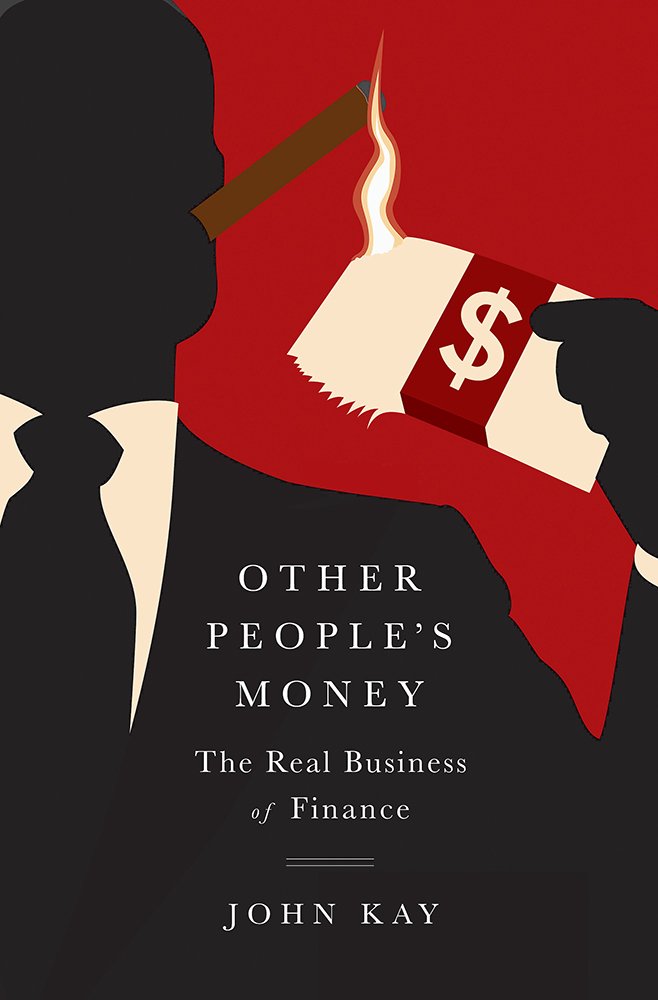
Other People’s Money: The Real Business of Finance
Author: John Kay
(Public Affairs Books)
The 2016 American election has been unhinged by outsider populists railing against Wall Street, trade deals, and income inequality. The Great Recession unleashed in 2008 has been brought under control, but the debates about corporations, giant banks and financial firms sticking it to the little guy and the taxpayer rages on.
British Economist John Kay deftly unravels the workings of global financial systems and how they succumbed to self-delusions and outright overreach in helping cause the great recession in his timely book, “Other People’s Money: The real business of finance.” The book offers fluid analysis and an indictment of modern financial systems and how they have been usurped by traders and financialisation of the markets. He peels back the layers of complexity, woven by the industry and its insiders to thwart any common sense assessments, as well as regulators and overseers. Kay writes in clean prose and cites some very smart people who nonetheless deluded themselves and the world into vastly risky behavior.
CEOs, bankers, traders all are exposed for their roles in the recent financial crisis. Concepts such as credit default swaps and collateralized debt obligations, the tools of modern finance, are brought under glaring spotlight. He also writes succinctly of moral hazard, the economics concept where one person takes more risks because someone else bears the cost of those risks. The government bailouts of 2008 can lead to further risky behavior, he argues, because the industry may believe the govt. will come to the rescue again in case of imminent collapse.
Kay writes that many companies today don’t need large pools of capital. He cites Apple as an example. “Many modern companies need very little capital,” he writes. “The stock market capitalization of Apple – the total market value of the company’s shares – is over $500 billion. Although the corporation has large cash balances – currently around $150 billion – it has few other tangible assets. Manufacturing is subcontracted.”
Kay presents analytical evidence and corrective measures that can be taken to improve the systems and points to origins of this behavior which have led to problems. American and British financial systems are explained in a manner the common citizen can understand. One problem Kay points to is the high reward system in place for traders, where complex trades enrich the few while essentially no productivity takes place. He says that the finance industry should be judged like others, and if they cannot be profitable or survive without taxpayer support, the trading should not happen. He writes, “Our willingness to accept uncritically the proposition that finance has a unique status has done much damage.” He also points out the failure of laws and regulations to protect the public. The finance sector of Western economies, especially US and Britain, are too large with a structure that rewards recklessness and supports an absurd volume of trading. Computers able to make lightning fast trades compound the problems.
“The finance sector devotes too little attention to the search for new investment opportunities and the stewardship of existing ones, and far too much to secondary-market dealing in existing assets.” Kay also argues that unwieldy regulation can sometimes make matters worse.
He believes in “good banks and effective asset managers,” but good banks and effective asset managers are not what he sees. Alas, he argues that a cultural change in the ethical standards of the industry is needed. But can that really happen considering the vast amount of money to be made using “other people’s money?”
He makes good points that we do need many of the activities that huge companies like Citigroup and Goldman Sachs engage in, but he says that we do not need Citigroup and Goldman to do them. He also states that many of the things done by these massive firms do not need to be done at all. According to Kay, the finance sector needs to be reminded of its primary purpose: to manage other people’s money for the benefit of businesses and households.
“It is an aberration when the some of the finest mathematical and scientific minds are tasked with devising algorithms for the sole purpose of exploiting the weakness of other algorithms for computerized trading in securities. To travel further down that road leads to ruin.”
On a video on his website about this book he says, “Modern economies need finance, we need a financial system to manage our payments to help us transfer wealth over our lifetime and between generations. We need a financial system to manage risk and we need a financial system to allocate capital. But the financial system we have created today is much larger and much more complex and much less robust then would be needed to achieve these purposes.” In the book he explains how to get the financial systems better adapted to the real needs of the real economy.
His prime argument is that the “finance world’s perceived profitability is not the creation of new wealth, but the sector’s appropriation of wealth – of other people’s money.” He shows how the sector has grown too large, and “detached itself from ordinary business and everyday life, and has become an industry that mostly trades with itself, talks to itself, and judges itself by reference to standards which it has itself generated. And the outside world has itself adopted those standards, bailing out financial institutions that have failed all of us through greed and mismanagement.”
This book should be among those read by all college and university students currently enrolled or are thinking about going into finance or any related industries to bring into focus its current shortcomings and to train these young minds, ethically and academically, to help prevent the next crisis. Or at the least not participate in creating one. John Kay is a visiting professor of economics at the London School of Economics and a fellow of St John’s College, Oxford University.



